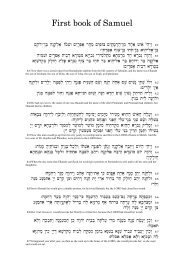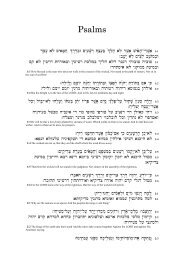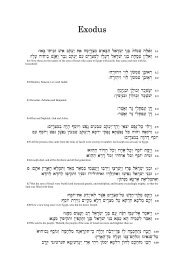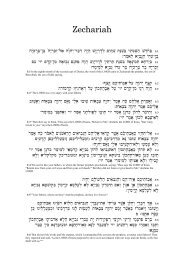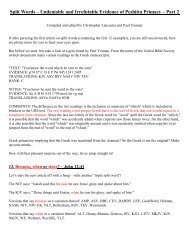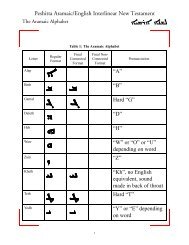ana translation
Untitled - Peshitta Aramaic/English Interlinear New Testament
Untitled - Peshitta Aramaic/English Interlinear New Testament
- No tags were found...
You also want an ePaper? Increase the reach of your titles
YUMPU automatically turns print PDFs into web optimized ePapers that Google loves.
112 SUPPLEMENTAL NOTES. [2<br />
PET. n. 19-m. 1<br />
(b) Again the verb<br />
; ^iCD, in = pa. (;.1CD) is usually eA7uo>, as 2 Joh.<br />
12, 3 Joh. 14; but in = aph. ('rZ2Q\) frequently as 2 ^you/xai, Pet.<br />
iii. 9. Yet 1 writes J^CQk) in 2 Joh., 3 Joh.; but in 2 Pet.,<br />
OCOSsO.*<br />
In (c) very many cases 1 leaves such participles unpointed. Sometimes<br />
also it combines the point over So with ribbui (e.g.<br />
Jud. 10) over plur. ptcps.<br />
In case of the participle aph. of ^1, which occurs 2 Pet. i. 5, ii. 1,<br />
1 writes in the former place ^ i \ VD, in the latter ^xJA^b,<br />
inconsistently.<br />
(d) On the whole, it appears that the usage of this manuscript (and<br />
others) is, to indicate the participle pael by a point over, the participle<br />
aphel by a point under, the word ;<br />
or under, the preformative So.<br />
usually, but not invariably, over,<br />
20. The codd. of Harkl. vary here, as do those of Philox. (see note<br />
in loc. on Syr. text, p. 18 supr.),<br />
between Ol.^ and .001\. Thus a<br />
(which White needlessly corrects), with 8,<br />
reads Ol^, against j3 y,<br />
tOOl^. (See Appx. II., in loc.)<br />
The pleonastic Oli* is idiomatic, and<br />
is undoubtedly to be read here .OCTL^ is apparently a scribe's correction<br />
; perhaps to conform to the Gr. aurots, for which Philox. : seems<br />
to have read avroiv, Harkl. to have omitted it.<br />
Ib. Harkl. represents TO. lu-^ara. by 1/U^] (more<br />
exact than the<br />
"\L'f +* of our version), and calls attention to the correction by inserting<br />
the Greek on his marg. (as in ver. 17,<br />
22. The rendering |OQa, in both versions, for e^epa/xa, points to<br />
Prov. xxvi. 11, where the same word is used by Pesh., and by Syr.-Hxp.<br />
(= t/xerov, LXX). It is possible that Philox. and Harkl. may have<br />
read l^rav here, with a few Gr. authorities.<br />
Ib. For |L.9Q1 = KvAior/m we have a parallel<br />
in Syr.-Hxp., Ezech.<br />
x. 13 (Symmach.) ;<br />
but it is nowhere found in Pesh. (O.T. or N.T.).<br />
III. i. ^yj] See first Note infr. on Jud. 14.<br />
Ib. Ja.21*]<br />
Here our earlier codices (so<br />
far as available ;<br />
9 hiat) are<br />
united in support of this word, and are joined by 11, 18, 19, 20.<br />
* In notes to Syr. text, on these three verses, the facts (as to cod. 1), here<br />
given exactly, are incorrectly stated.



